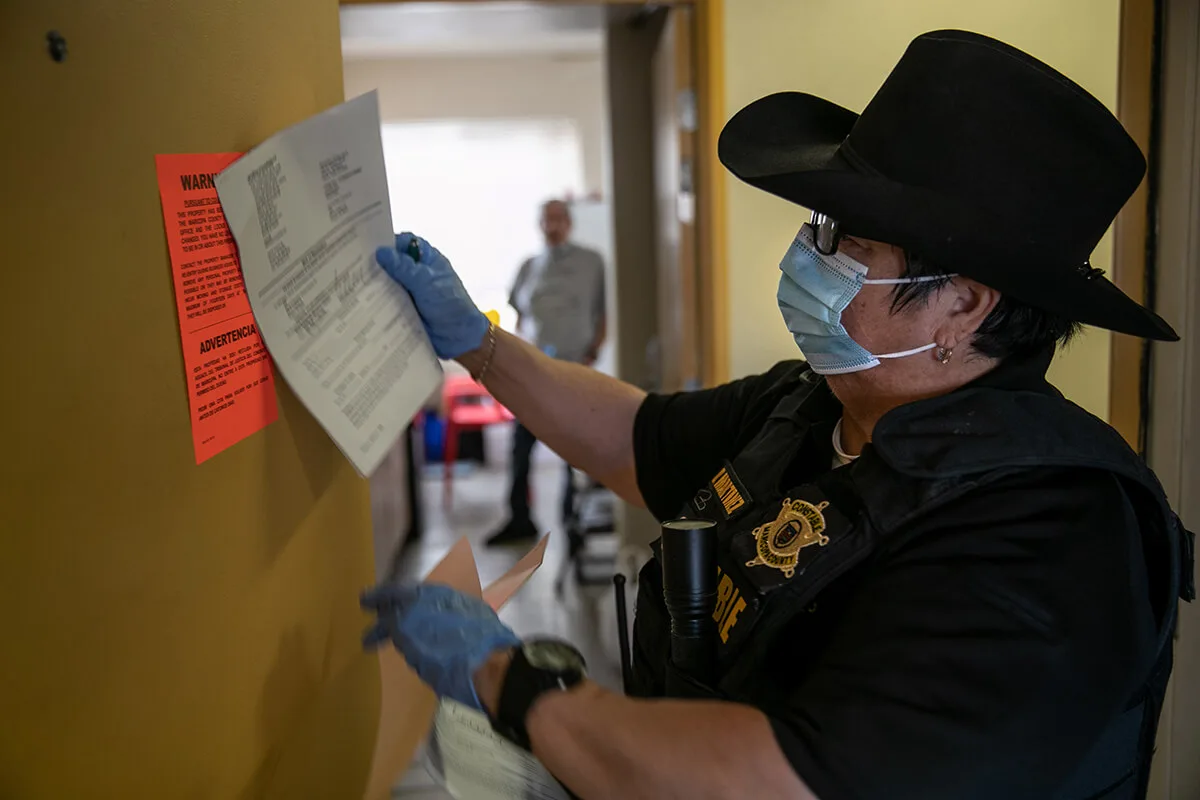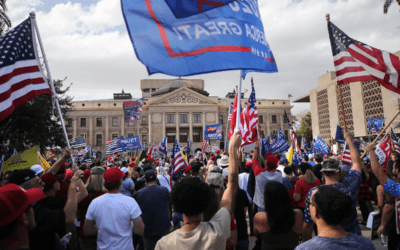
John Moore/Getty Images
“I think it could be a tough winter for people.”
While Arizona agencies have doled out millions of dollars in rental aid over the past few months, the larger problem still remains—more than half a million Arizonans could be facing eviction come December.
Arizona had instituted a ban on eviction enforcement that was in place through July 25, which was later extended it through Oct. 31. The federal government also announced a national ban on evictions in September, which is set to expire at the end of the year.
According to the Aspen Institute’s latest report, 470,000 to 771,000 Arizonans are at risk of eviction. That’s 204,000 to 335,000 households, or 22% to 39% of the state’s total households.
Kelly McGowan, deputy director of nonprofit Wildfire AZ, told The Copper Courier that while there is still aid to give out, the pandemic could very easily outlast the funding.
“If there is not any additional stimulus, there will not be money come post-December, which could be the height of when we’re going to see the moratorium end, we’re going to see if there’s further shutdowns, and we could be out of money,” McGowan said. “So come January could be a real crisis if something significant doesn’t happen.”
Distributing aid
So far, McGowan said, Wildfire AZ has distributed nearly $12 million of federal aid to about 3,000 families. The money was part of the Coronavirus Aid, Relief, and Economic Security (CARES) Act funding given to the city of Phoenix. The city partnered with local organizations to review applications and administer the money.
The state Department of Housing is also giving out its own rental aid, although it has struggled over the past few months to keep up with demand.
As of July, 46% of the more than 18,000 applications received were in review. As of October, more than 11,000 applications are still under review. So far, only 12% of all of the applications have been approved.
However, 21% of all applicants have been helped, because some receive “non-state assistance.” The average assistance granted per application is $920.
The program shows that the economic consequences of COVID-19 are still hitting families hard. The state saw just under 500 new applications come in the week of Oct. 19, almost six months after businesses began shutting down. More than 29,000 applications have been submitted in total.
Unemployment woes
McGowan explained that although some people have gotten their jobs back as businesses have reopened, they are often not making the same amount they did before the pandemic.
“Even if they’re getting their jobs back, we’re seeing a lot of people who are not getting their jobs back in the same way, so reduced hours or different schedules,” she said. “Income certainly isn’t as substantial and steady as prior to the crisis.”
Judge Anna Huberman, a Maricopa County Justice of the Peace who presides over eviction hearings, told The Copper Courier there are other scenarios still keeping people from making money.
“There’s parents who have to stay home because their kids are home from school,” she said. “I’ve heard a lot of people who actually either had COVID themselves or had COVID symptoms and because of that they are forced to stay home from work and they’re not getting paid.”
Things have gotten even more dire for some people as the federal unemployment boost has ended and Congress failed to approve more aid.
“The federal unemployment insurance has run out for a lot of folks, which really got them through the summer,” McGowan said. “So now people who are unemployed are at that $240 level a week, and nothing has been done in the state to increase that number.”
Illegal evictions
Some tenants who believe they are protected under eviction moratoriums have had to battle claims otherwise.
Both McGowan and Huberman said they have heard renters report being kicked out of their homes despite believing they have a COVID-related reason for not paying rent.
“The only way that a landlord can evict a tenant is with a judicial order but … there was a lot of anecdotal evidence that the number of illegal evictions had gone up and so landlords are just locking people out of their home,” Huberman said.
Huberman said this can happen if renters don’t know their rights due to the “roller coaster of information” they are dealing with. Some renters have told her, she said, that the landlord told them couldn’t stay so they simply moved out.
Renters can still be evicted during this time if they do not have a COVID-related reason for nonpayment or if they do no meet all of the requirements for protection.
Huberman noted that if tenants want to take advantage of the federal moratorium, they need to be careful to fully complete the process. While applying for rental assistance is part of the requirements, renters also need to sign and present a declaration from the U.S. Centers for Disease Control and Prevention to their landlords.
New wave
Adding to concerns is the rising number of COVID-19 cases across the country. Aside from infecting more people, the virus could also lead to more shutdowns, and thus, more job loss.
According to an Arizona State University professor, the state is seeing a surge of the virus. Case numbers are similar to what they were in early June, before the state hit its peak number of cases the following month.
Wildfire AZ is calling on the governor’s office to release more of the CARES money it could use toward preventing evictions.
McGowan said they would also like to see Congress pass another stimulus package. While the nonprofit is not yet calling for another extension of the eviction moratorium, it’s possible as the end of the current one gets closer.
“I think it could be a tough winter for people,” she said.
Support Our Cause
Thank you for taking the time to read our work. Before you go, we hope you'll consider supporting our values-driven journalism, which has always strived to make clear what's really at stake for Arizonans and our future.
Since day one, our goal here at The Copper Courier has always been to empower people across the state with fact-based news and information. We believe that when people are armed with knowledge about what's happening in their local, state, and federal governments—including who is working on their behalf and who is actively trying to block efforts aimed at improving the daily lives of Arizona families—they will be inspired to become civically engaged.


He said what? 10 things to know about RFK Jr.
The Kennedy family has long been considered “Democratic royalty.” But Robert F. Kennedy, Jr.—son of Robert F. Kennedy, who was assassinated while...

Here’s everything you need to know about this month’s Mercury retrograde
Does everything in your life feel a little more chaotic than usual? Or do you feel like misunderstandings are cropping up more frequently than they...

Arizona expects to be back at the center of election attacks. Its officials are going on offense
Republican Richer and Democrat Fontes are taking more aggressive steps than ever to rebuild trust with voters, knock down disinformation, and...

George Santos’ former treasurer running attack ads in Arizona with Dem-sounding PAC name
An unregistered, Republican-run political action committee from Texas with a deceptively Democratic name and ties to disgraced US Rep. George Santos...





